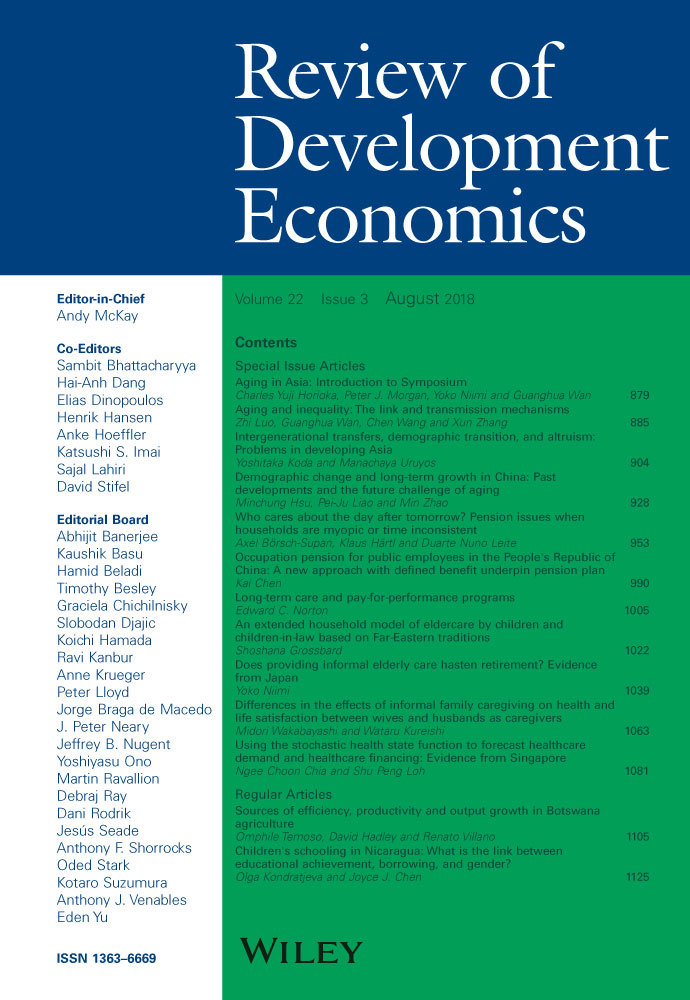When do in-service teacher training and books improve student achievement? Experimental evidence from Mongolia
Corresponding Author
Habtamu Fuje
The World Bank
Correspondence Habtamu Fuje, The World Bank, Washington, DC 20433, USA.Email: [email protected] or [email protected]Search for more papers by this authorCorresponding Author
Habtamu Fuje
The World Bank
Correspondence Habtamu Fuje, The World Bank, Washington, DC 20433, USA.Email: [email protected] or [email protected]Search for more papers by this authorAbstract
This study presents evidence from a randomized controlled trial in Mongolia on the impact of in-service teacher training and books, both as separate educational inputs and as a package. It tests for complementarity of inputs and nonlinearity of returns from education investment, as measured in students’ test scores. The result suggests that the provision of books, on top of teacher training, raises students’ achievement substantially. However, teacher training and books weakly improve test scores when provided individually. This study sheds light on the relevance of supplementing teacher training schemes with appropriate teaching materials in resource-poor settings.
REFERENCES
- Angrist, J. D., & Lavy, V. (2001). Does teacher training affect pupil learning? evidence from matched comparisons in jerusalem public schools. Journal of Labor Economics, 19(2), 343–369.
- Becker, S. O., & Ichino, A. (2002). Estimation of average treatment effects based on propensity scores. Stata Journal, 2(4), 358–377.
- Bunyi, G. W., Wangia, J., Magoma, C. M., & Limboro, C. M. (2013). Teacher preparation and continuing professional development in kenya: Learning to teach early reading and mathematics.
- Cameron, A. C., Gelbach, J. B., & Miller, D. L. (2008). Bootstrap-based improvements for inference with clustered errors. The Review of Economics and Statistics, 9(3), 414–42.
- Clotfelter, C. T., Ladd, H. F., & Vigdor, J. L. (2006). Teacher-student matching and the assessment of teacher effectiveness. The Journal of Human Resources, 41(4): 778–820.
- Conn, K. M. (2014). Identifying effective education interventions in sub-saharan africa: A meta-analysis of rigorous impact evaluations.
- Evans, D. K., & Popova, A. (2014). What works to improve learning in developing countries? an analysis of divergent findings in systematic reviews.
- Glewwe, P., Kremer, M., & Moulin, S. (1998). Textbooks and test scores: Evidence from a prospective evaluation in kenya.
- Glewwe, P., Kremer, M., & Moulin, S. (2009). Many children left behind? textbooks and test scores in kenya. American Economic Journal: Applied Economics, 1(1), 112–135.
- Glewwe, P. W., Hanushek, E. A., Humpage, S. D., & Ravina, R. (2013). School resources and educational outcomes in developing countries: A review of the literature from 1990 to 2010. Education Policy in Developing Countries, pp. 13–64.
10.7208/chicago/9780226078854.003.0002 Google Scholar
- Government of Mongolia. (2007). Millennium development goals based comprehensive national development strategy of mongolia.
- Hanushek, E. A. (2004). What if there are no ‘best practices’? Scottish Journal of Political Economy, 51(2), 156–172.
- Hanushek, E. A., & Rivkin, S. G. (2010). Generalizations about using value-added measures of teacher quality. The American Economic Review, 100(2), 267–271.
- Harris, D. N., & Sass, T. R. (2011). Teacher training, teacher quality and student achievement. Journal of Public Economics, 95(7), 798–812.
- Heyneman, S. P., Jamison, D. T., & Montenegro, X. (1984). Textbooks in the philippines: Evaluatin of the pedagogical impact of a nationwide investment. Educational Evaluation and Policy Analysis, 6(2), 139–150.
- Jacob, B. A., & Lefgren, L. (2004). The impact of teacher training on student achievement: Quasi-experimental evidence from school reform efforts in chicago. The Journal of Human Resources, 39 (1), 50–79.
- Jamison, D. T., Searle, B., Galda, K., & Heyneman, S. P. (1981). Improving elementary mathematics education in nicaragua: An experimental study of the impact of textbooks and radio on achievement. Journal of Educational Psychology, 73(4), 556–567.
- Kidwai, H., Burnette, D., Rao, S., Nath, S., Bajaj, M., & Bajpai, N. (2013). In-service teacher training for public primary schools in rural india: Findings from district morigaon (assam) and district medak (andhra pradesh).
- Lai, F., Sadoulet, E., & Janvry, A. d. (2011). The contributions of school quality and teacher qualifications to student performance: Evidence from a natural experiment in beijing middle schools. Journal of Human Resources, 46(1), 123–153.
- Linden, L. L. (2008). Complement or substitute? the effect of technology on student achievement in india.
- McEwan, P. J. (2014). Improving learning in primary schools of developing countries a meta-analysis of randomized experiments. Review of Educational Research.
- MEC, LRCM, (2008). Follow-up survey for READ project: Some results of the survey.
- Mullens, J. E., Murnane, R. J., & Willett, J. B. (1996). The contribution of training and subject matter knowledge to teaching effectiveness: A multilevel analysis of longitudinal evidence from belize. Comparative Education Review 40(2), 139–157.
- National Statistical Office. (2006). Mongolian statistical yearbook 2006.
- Raudenbush, S. W., Eamsukkawat, S., Di-Ibor, I., Kamali, M., & Taoklam, W. (1993). On-the-job improvements in teacher competence: Policy options and their effects on teaching and learning in thailand. Educational Evaluation and Policy Analysis, 15(3), 279–297.
- Rosenbaum, P. R., & Rubin, D. B. (1983). The central role of the propensity score in observational studies for causal effects. Biometrika, 70(1), 41–55.
- Rothstein, J. (2010). Teacher quality in educational production: Tracking, decay, and student achievement. The Quarterly Journal of Economics, 125(1), 175–214.
- Sabarwal, S., Marshak, A., & Evans, D. K. (2014). The permanent input hypothesis: the case of textbooks and (no) student learning in sierra leone.
- Todd, P. E., & Wolpin, K. I. (2003). On the specification and estimation of the production function for cognitive achievement. The Economic Journal, 113(485), 3–33.
- World Bank, W. (2006). Mongolia: Rural education and development project, project files, client connection.
- World Bank, W. (2013). Implementation completion and results report: Rural education and development project.
- Yang, A., & Sato, Y. (2009). Secondary education regional information base, country profile mongolia.
- Zhang, L., Lai, F., Pang, X., Yi, H., & Rozelle, S. (2013). The impact of teacher training on teacher and student outcomes: evidence from a randomised experiment in beijing migrant schools. Journal of Development Effectiveness, 5(3), 339–358.




